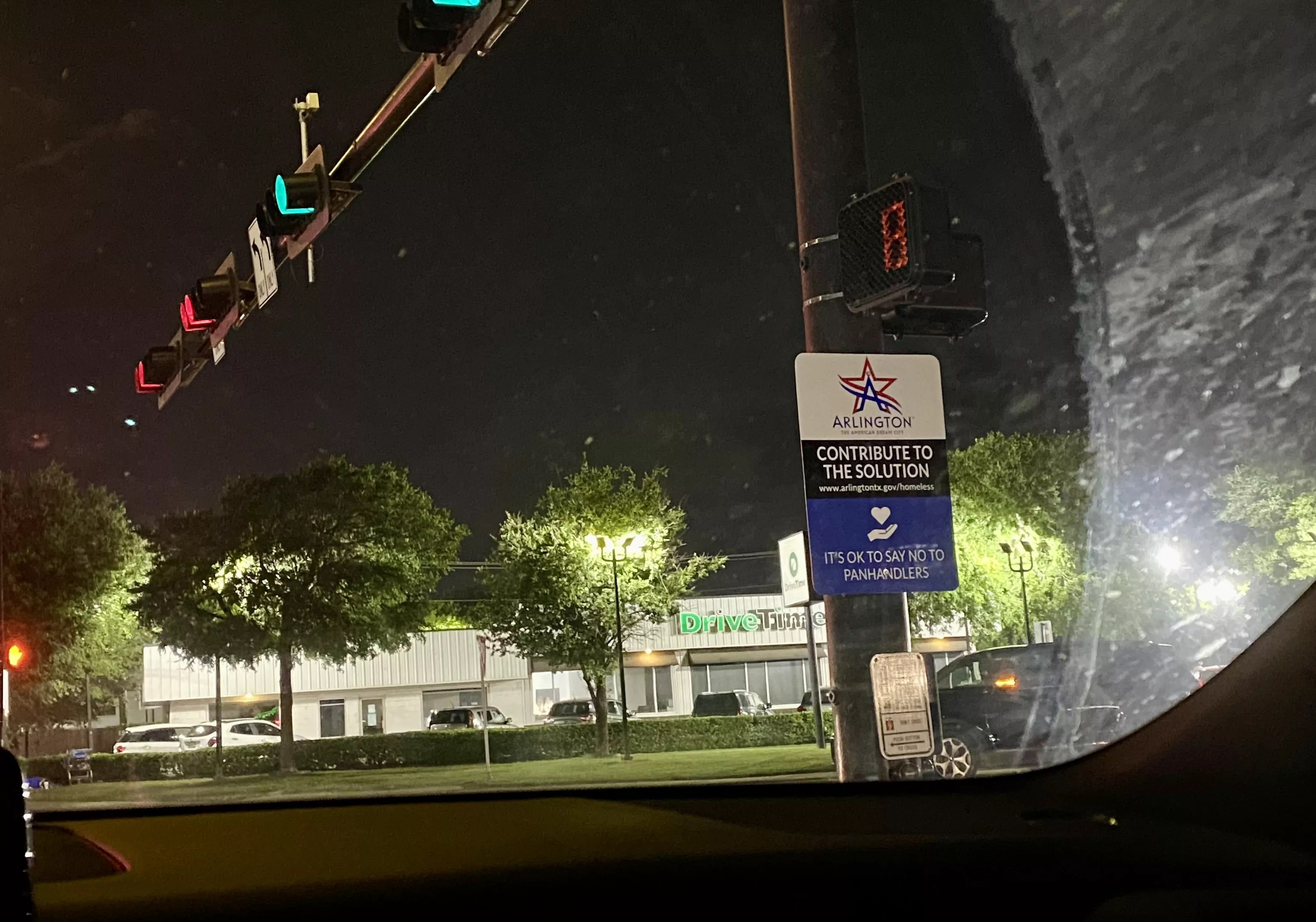
Lauren Daniels

Audio By Carbonatix
You may have seen the signs cropping up in North Texas cities: “Don’t give money to panhandlers,” they advise.
For those of us raised on Texan values of friendship and kindness, this directive may come as a surprise. Some support the signs’ framing, but others say it works to further stigmatize an already marginalized group.
The city of Dallas tweeted out a similar instruction last week.
“Giving spare change from the window of our cars may seem like a quick fix, but it often perpetuates the cycle of poverty and homelessness,” the post reads. “Our Give Responsibly campaign urges everyone to think twice before handing out cash on the street.”
Giving spare change from the window of our cars may seem like a quick fix, but it often perpetuates the cycle of poverty and homelessness.
Our Give Responsibly campaign urges everyone to think twice before handing out cash on the street. pic.twitter.com/wPqKx33w6u
— City of Dallas (@CityOfDallas) July 11, 2023
A flyer accompanying the city’s post urges people to “give responsibly to Dallas residents experiencing homelessness.” Clicking on the image’s QR code takes you to the city’s Office of Homeless Solutions website, where you can make donations.
The office advises readers that offering spare change or a meal “inadvertently encourages individuals to continue illegally soliciting.” Basically, they argue, it’s a temporary fix – like slapping a Band-aid on a gaping wound or perhaps eating a meal when one is hungry.
In late June, a user in a Dallas Reddit group posted a photo of an anti-panhandling sign, which some commenters said stands in Irving. It reads: “Soliciting is not safe. Change the way you give. Give to your local charities.”
It’s not just a Texas thing, though. Signs with similar messaging have cropped up in cities across the country – from Rapid City, South Dakota, to Scottsdale, Arizona.
Other North Texas cities have unveiled similar sentiments, including Plano and Arlington. The latter introduced signs that say: “Contribute to the solution. It’s OK to say no to panhandlers.”
Wayne Walker, CEO of the faith-based nonprofit aid group OurCalling, agrees.
“It doesn’t really support helping someone get off the streets,” he said. “Often what it can do is reward them for staying there and asking [for money], and being in that spot on a regular basis.”
He argued that the cash going to longtime panhandlers clearly isn’t helping them get off the streets. Instead, panhandling is essentially their job, Walker said, pointing out that some folks have taken in significant amounts.
It’s one thing to hand out water or granola bars, Walker said. Those items are good to help people survive the brutal heat. Nonetheless, it’s important to emphasize more viable solutions like contributing to charities; passing out sandwiches helps in the moment, but it doesn’t solve the problem of where the unhoused will find their next day’s meal.
The way Walker sees it, giving money directly to panhandlers does more to “enable” them to maintain the status quo rather than help them overcome homelessness.
“If you’re looking for long-term needs, if you’re looking to actually help them get off the streets, then that’s a completely different conversation than passing 10 bucks out your window,” he said.
“There are more kind and understanding and nuanced ways to discuss this issue,” – Dr. Hannah Lebovits, assistant professor of planning and public affairs
Over the past two decades or so, the Dallas-Fort Worth-Arlington region has seen a major affordable housing crisis, said Hannah Lebovits, an assistant professor of planning and public affairs, who has a doctorate in urban and public affairs. The issue has left many people unable to access secure housing, contributing to a spike in the socially vulnerable population.
Most unhoused people would rather remain “privately vulnerable,” such as by living in their car or a storage unit, or by going to a shelter, she said. Yet when those options run out – whether because of capacity constraints or their own behavior – they’ll become “publicly vulnerable.”
“We only tend to see them right towards the end, when they are finally reaching out to the general public to say, ‘Hey, can someone help me? I can’t get help any other way,'” Lebovits said. “When we see panhandlers on the street, that’s who we see.”
Simply put, these people have run out of other options, she explained.
To Lebovits, anti-panhandling signs falsely suggest that the homeless are intentionally not seeking aid. But the reality is that there’s a huge gap in services.
Even if panhandlers were to have a good day – say, passersby were feeling generous on a Sunday – the money raised isn’t part of the formal economy, she said. They still don’t have pay stubs or an employer to put on their resume. That cash won’t carry the same economic benefit as a regular job. How can one rent an apartment without proof of income?
Criminalizing the homeless won’t help them get off the streets any sooner, Lebovitz added.
“There are more kind and understanding and nuanced ways to discuss this issue,” she said. “And leaving up signs, which create a false narrative and which imply that people should essentially not be charitable and kind to individuals who they see struggling, is not the way to go.”